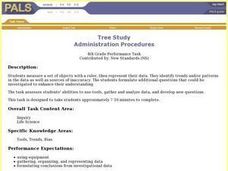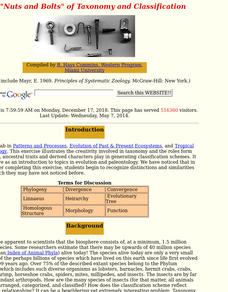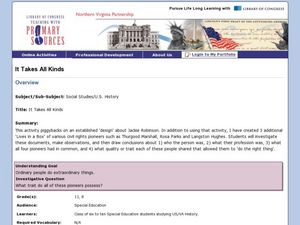Curated OER
Color in the Garden
Third graders study color in a garden environment. In this color lesson, 3rd graders explore the colors of living and nonliving elements within a garden environment. Resources are provided.
Curated OER
Vermicomposting
Third graders study vermicomposting. In this vermicomposting lesson, 3rd graders prepare to begin a unit on decomposition by constructing a worm bin. Students collect worms to be used later in experiments.
Curated OER
The Coral Reef
Fourth graders discuss life in a coral reef, and view photographs and a computer program about coral reefs. They design and create colorful watercolor, ink, and crayon drawings of coral reefs.
Curated OER
Hey, Look Me Over!
Students make observations about mealworms using hand lenses, rulers, and cotton swabs. Students complete their own mealworm observation chart, then they share their observations with the class. This is one station out of five in an...
Curated OER
LESSON PLANS (print version) pdf What is a Fossil?
Students can better explain how mould and cast fossils occur when they make their own cast fossils using plaster of Paris and objects such as shells, bone or even their own hand or footprint.
Curated OER
Understanding the Steps in a Process
Students read, "Center for Drug Evaluation and Research: FAQs", and discuss with questions embedded in the lesson.
Curated OER
Benthic Macroinvertebrates
Learners survey and describe a stream ecosystem. They sample the benthic macroinvertebrate populations of a given stream and determine community structure through the use of the Chandler Index and a species diversity index.
Curated OER
Tree Study
Students measure the lengths of provided leafs to the nearest millimeter. Students identify trends in the data as well as sourced of inaccuracy and formulate additional questions that could be investigated to enhance their understanding.
Curated OER
Adaptations To the Environment
Pupils design and construct an imaginary animal that is perfectly adapted to a particular type of biome. They give the animal a scientific name, place it in a phylum and write descriptions about its behavior, reproduction, foraging,...
Curated OER
Rocks Review
In this rocks worksheet, students review the characteristics of igneous, metamorphic, and sedimentary rocks. This worksheet has 4 true or false, 16 fill in the blank, and 5 matching questions.
Curated OER
Fun with Phylogenetic Trees
Tenth graders differentiate angiosperms and gymnosperms. In this biology lesson, 10th graders construct a musical phylogenetic tree from information they gathered on resource websites. They present their project in class.
Curated OER
The "Nuts and Bolts" of Taxonomy and Classification
Students develop classification scheme that meets the established rules of the Linnaean system. They write one page essay on classification choices.
Curated OER
Saving Habitat
Learners pick an animal native to Maryland and research how populations of that animal might be affected by land use changes over the past thirty years. They predict population trends for the next thirty years.
Curated OER
Gonna Take a Sedimentary Journey
Pupils collect water samples from a local source, test it, filter it and identify the materials suspended in it. Students disucss the possible sources of sediment in their watershed.
Curated OER
Flying Geese
Students examine the Flying Geese quilt pattern, and discuss and identify the pattern. They write a paragraph titled, My Quilt Report, summarizing the information discussed about the quilt patterns.
Curated OER
The Cost of Life
Students research the salary for a career of interest. They consider what kind of lifestyle that career would provide and graph their information for comparison.
Curated OER
Memorandum of a Conference with President Eisenhower after Sputnik
Students document and list excerpts from a document that shows how calmly officials reacted to the launching of Sputnik. They research contemporary magazines and newspaper articles of the day as well.
Curated OER
It Takes All Kinds!
Students view video clips and observe similarities and differences between animals. They sort animals into groups for a zoo. They make a graph of their observations and review scientific classifications.
Curated OER
Collect, organize and compare different data for the Marine Mammals of the Miami Seaquarium, i.e.: size, weight, diet and habitat and how to calculate average, median, mode and range.
Students collect, organize, and compare different data and develop statistical methods such as: average, median, mode and range as a way for decision making by constructing table
Curated OER
Picture Tomorrow
Students discuss their plans for the future. they draw pictures of something from their future that they plan to do or be. They display their art work in the classroom.
Curated OER
Where You Belong
Students identify different groups to which they belong, and use counting techniques to take a census of their family and class.
Curated OER
"Bug Hunt"
Fourth graders find bugs represented on a grid and then identify their name and physical characteristics that provide a picture of the bug using imagery.
Curated OER
Scientific Inquiry
Middle schoolers make inferences about what activities occur at different places in school. They form a hypothesis as to how space is used. They simulate how archeaologists explore past people by designing and conducting a research project.
Curated OER
"Habitats"
Students complete a unit of lessons on animals and animal conservation. They observe a square meter of ground outside the school, set up a model environment, analyze an owl pellet, grow bread mold, and explore various websites.

























